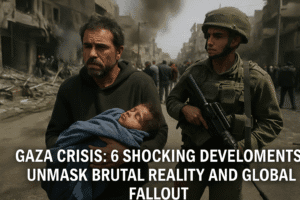Gaza Crisis: 6 Shocking Developments Unmask Brutal Reality and Global Fallout
At least eight Palestinians were killed and dozens wounded in a dawn shooting near Israeli- and U.S.-supported aid distribution points in Khan Younis; witnesses blamed the Israeli military, which offered no immediate comment. This tragedy underscores the extreme danger facing civilians seeking basic sustenance. Meanwhile, UK Labour leader Keir Starmer faces significant internal party division and union pressure over his refusal to endorse immediate recognition of a Palestinian state.
Israel has strategically shifted some forces from Gaza to reinforce its northern borders against heightened threats from Iran-backed militias like Hezbollah. In a powerful display of dissent, tens of thousands protested in the Netherlands against Israel’s actions and Dutch policy. Palestinians in Gaza continue to endure a severe humanitarian crisis, with critical shortages including access to safe drinking water. Efforts to negotiate a hostage release remain stalled, complicated by regional tensions, with no end to the devastating conflict in sight.

Gaza Crisis: 6 Shocking Developments Unmask Brutal Reality and Global Fallout
(June 16, 2025) The situation in Gaza remains fraught with tragedy, political tension, and strategic shifts, as evidenced by several critical developments over the past 24 hours:
- Tragedy at Dawn: Deadly Shooting Near Gaza Aid Sites (Khan Younis)
- The Incident: At least eight Palestinians were killed and dozens wounded early Sunday near aid distribution points in Khan Younis supported by Israel and the US. Health officials confirmed the casualties.
- Witness Accounts: Multiple witnesses attributed the gunfire, occurring around dawn as people gathered for aid, to the Israeli military. One described the scene as “a trap.”
- Official Silence & Criticism: The Israeli military did not immediately comment. This incident fuels existing concerns, as the UN has previously criticized the new aid distribution system’s effectiveness and safety. It underscores the extreme peril civilians face even when seeking basic sustenance.
- Labour’s Deepening Divide: Starmer Resists Immediate Palestinian State Recognition (UK)
- Internal Rift: UK Labour leader Keir Starmer faces mounting pressure and internal division over his refusal to support immediate recognition of a Palestinian state.
- Union Pressure: The Trades Union Congress (TUC), aligning with French and Canadian unions, issued a communique demanding their governments recognize Palestine “immediately.” This amplifies pressure on Starmer from within the labour movement.
- Diplomatic Context: The rift highlights the Labour Party’s struggle to formulate a unified foreign policy stance on Gaza amidst ongoing international diplomatic efforts concerning the conflict.
- Strategic Redeployment: Israel Shifts Forces from Gaza to Northern Borders
- The Move: Israel has begun redeploying some military forces from Gaza operations to reinforce its northern borders with Lebanon and Syria, and potentially the eastern frontier (Haaretz).
- Reason: The shift aims to counter an elevated threat of infiltration by Iran-backed militias, notably Hezbollah in Lebanon, exploiting the ongoing Gaza conflict.
- Broader Implications: This reflects Israel’s assessment of a multi-front security challenge, needing to address heightened regional tensions with Iran and its proxies while continuing operations in Gaza.
- Mass Protest in The Hague: “Red Line” Against Gaza Siege (Netherlands)
- The Demonstration: Tens of thousands of protesters, including families, gathered in The Hague on Sunday. Organizers estimated 150,000 participants.
- Symbolism & Message: Dressed in red to form a symbolic “red line,” protesters voiced strong opposition to Israel’s siege of Gaza and criticized the Dutch government’s stance on the war.
- Growing Discontent: This marks the second major protest in a month, signaling significant public dissent in the Netherlands regarding the Gaza conflict and national policy.
- Ongoing Toll & Humanitarian Crisis
- Casualties: Separate Israeli strikes reportedly killed at least 20 Palestinians across Gaza. The cumulative death toll continues to rise over 20 months since the conflict’s start.
- Water Crisis: Palestinians face severe difficulties accessing safe drinking water, a critical aspect of the deepening humanitarian catastrophe (AP).
- Human Cost: The funeral of Israeli reservist Sgt. First Class (res.) Noam Shemesh, killed in Gaza, was held in Jerusalem, a somber reminder of the conflict’s cost on all sides.
- Regional Ripples: Hostage Talks & UK Stance
- Hostage Negotiations: Israeli officials are reportedly assessing how recent direct military exchanges with Iran might impact stalled hostage negotiations with Hamas, mediated by Qatar, Egypt, and the US (Haaretz).
- UK Military Posture: UK Chancellor Jeremy Hunt stated British military assets could “potentially” be used to defend Israel, adding “we’re not ruling anything out” regarding deployment (Sky News). This signals continued Western political support.
Why This Matters:
- Humanitarian Catastrophe: The aid site shooting tragically exemplifies how the conflict imperils civilians seeking basic survival. The water crisis highlights the collapse of essential infrastructure.
- Diplomatic Fractures: The Labour Party rift and massive Dutch protests illustrate how the Gaza war is creating significant political divisions internationally and shaping foreign policy debates.
- Evolving Conflict: Israel’s troop redeployment signals a potential shift towards a more defensive posture on other fronts, acknowledging the prolonged nature of the Gaza conflict and wider regional threats.
- No End in Sight: Despite ongoing talks and international pressure, the cycle of violence, casualties (both Palestinian and Israeli), and deepening humanitarian suffering shows no sign of abating. The events in Khan Younis are a stark, heartbreaking example of the daily reality for Gazans. The path to de-escalation and a sustainable political solution remains obscured.
You must be logged in to post a comment.